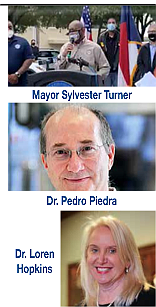New Study Indicates COVID-19 Rates 4x Higher Than Reported in Houston
Jo-Carolyn Goode | 12/18/2020, 10 a.m.
COVID-19 cases seem to be four times higher than reported according to a new study from the Houston Health Department. Through a partnership with Baylor College of Medicine and Rice University, volunteers’ blood from Houston area households was subject to random viral testing for COVID-19 antibodies.
COVID-19 antibodies are seen in individuals who previously had the coronavirus. Testing of the volunteers showed that approximately 250,000 people had the virus by September 19 but reports from the same time frame show only 57,000 people were infected.
“Transparency is a critical part of our mission during the pandemic and our goal is to keep the public informed about the COVID-19 infection rate and how people can practice safe and healthy habits,” said Mayor Sylvester Turner. “This information, combined with findings from the department’s wastewater testing, PCR clinical case surveillance system and other programs, analyzed with advanced data science techniques, gives us invaluable insight to precisely target testing and educational resources to help save lives.”
Over 600 people from 420 households were tested virally on September 8-19. Each provided a blood sample and answered several questions. Results show that more women than men were infected with the virus. It is no surprised that minorities were heavily hit by the virus than others. The city says that minority virus rates were higher in Hispanics (18%) and Blacks (15%) compared to non-Hispanic Whites (5%). Rates were also higher for those under the age of 40 at 17% compared to those over 40 at 9%.
“We used two labs to verify results and we are confident this data gives us reliable new information on the extent of the spread of this virus in our community,” said Dr. Loren Hopkins, chief environmental science officer for the Houston Health Department.
“Along with tracking virus spread, the survey will provide insight on how much antibodies were made and how long they last over a 4-month interval (short-term duration) in blood circulation. In addition, the survey may help identify short-term immunity after infection,” said Dr. Pedro Piedra, professor of molecular virology and microbiology at Baylor College of Medicine.
This study is phase one of the ongoing project. Phase two of the project is planned to begin in January. The same volunteers that participated in phase one will again be re-tested to learn the number of antibodies still in the blood. In addition, a set of new volunteers will be tested.
“This antibody testing investigation is a wonderful example of a partnership between academics and a local health department to answer key questions together about a pandemic that is poorly understood,” said Dr. Elaine Symanski professor in the Center for Precision Environmental Health and Department of Medicine at Baylor College of Medicine. “It would not have been possible without the critical involvement of Houstonians who agreed to participate. We owe them a great deal of thanks.”
This survey is funded by the Centers for Disease Control and Prevention.
For more information, visit HoustonEmergency.org.





